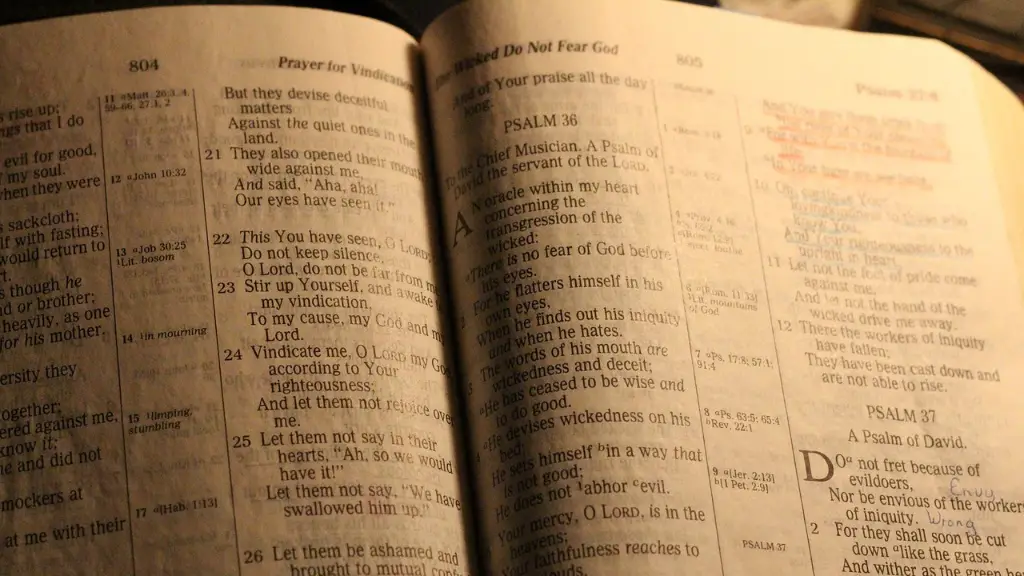The debate about homosexuality in Christianity is as controversial as ever as more and more countries legalize same-sex marriage and countless denominations struggle to interpret the Bible and keep up with the changing moral landscape.
But what does the Bible really say about homosexuality? Bible scholars are divided on the subject, but there are a few general truths that they agree on. Of course, how you interpret the Bible’s teachings is ultimately up to you.
The first thing to know is that the Bible holds that sexual relationships should only be between a man and a woman within the bonds of marriage. This is made clear in the book of Genesis, which states that “God commanded them to be fruitful and multiply.” This does not condone any sexual relationships outside of marriage, so it does not include same-sex couples.
The Bible also tells us that homosexuality is a sin. It’s written in Romans 1:26-27 that “women exchanged their natural sexual relations for unnatural ones and men too gave up natural relations with women and were inflamed with lust for one another.” Therefore, according to the Bible, homosexuality is seen as unnatural.
However, the Bible is not the only source of truth when it comes to this issue. Although the church holds that the Bible is the ultimate authority, many Christians have argued that a loving God would accept same-sex relationships. In other words, it is possible to interpret the Bible in a more open-minded way, as a reflection of God’s love for all types of people.
The Bible also speaks of love and understanding, even for sinners. In the book of Matthew, Jesus urges us to “love your enemies and pray for those who persecute you.” So, the Bible does not merely condemn those who engage in same-sex relationships; instead, it encourages us to show love and compassion to everyone, regardless of their beliefs or lifestyle choices.
While the debate about what the Bible says about homosexuality is ongoing, it is important to remember that the Bible is filled with stories of compassion and understanding. No matter what your beliefs may be, it is possible to show love and acceptance towards all people and to treat them with the same respect you would want for yourself.
Homosexuality and Christianity Across History
While the Bible itself has remained unchanged over time, opinions on how to interpret its teachings on homosexuality have evolved over time. In ancient Judeo-Christian teachings, homosexuality was seen as a sin, just like adultery or any other form of non-marital sexual practice. However, over the centuries, people have become more open to the idea of homosexuality as an accepted part of life.
The debate about homosexuality and Christianity has a long history. In the late nineteenth century, some Christian denominations began to revise their views on the matter. The Congregational Church in North America, for example, declared in 1891 that “homosexuality is an inversion of nature” rather than a sin. Similarly, the United Church of Canada declared in 1996 that while they believe that God’s plan is for marriage between a man and a woman, they also believe that same-sex relationships “may reflect the love of God.”
In recent years, there has been a further shift in attitudes towards homosexuality and Christianity. The Anglican Communion, which holds that scripture provides the “ultimate authority” on moral issues, recently declared that it “does not regard homosexual activity as wrong”. Similarly, the Presbyterian Church of the US declared in 2011 that it “believes God’s grace is available to all, regardless of sexual orientation or gender identity.”
However, there are still some denominations that hold traditional views on homosexuality, such as the Southern Baptist Convention and the Catholic Church. But even these still affirm the importance of showing love and compassion to all, regardless of their beliefs.
Effect of Social and Political Change
The larger trend of social and political change affects Christian views on homosexuality too. As more and more countries legalize same-sex marriage, the church is struggling to reconcile its belief in the sanctity of traditional marriage with its love and acceptance of homosexuals. Although the church still holds that same-sex marriage is wrong, it’s clear that its views are evolving.
For example, the Catholic Church recently declared that while it still believes that marriage should be between a man and a woman, it is still possible to love and accept those who engage in same-sex relationships. Similarly, the United Methodist Church recently declared that it will “welcome and include all persons, regardless of sexual orientation, into the full life of the Church.”
It’s clear that these changes have been driven by the larger trend of social and political change in the world, as more and more countries recognize same-sex marriage as a legal institution. As this trend continues, it’s likely that the church will continue to evolve its views on the matter.
How Should Christians Treat Others?
No matter one’s view on the matter, it is clear that the Bible calls us to love, acceptance, and understanding of all people. After all, Jesus Himself said, “Whoever welcomes one such child in my name welcomes me.” So, all Christians should strive to show love and acceptance to all people, regardless of their beliefs or lifestyle choices.
At the same time, Christians should strive to understand the beliefs of others, even those with whom we disagree. To do this, a spirit of openness and dialogue is needed. Christians should try to understand the views of those who disagree with them and show respect for their beliefs, even if they believe those beliefs are wrong.
In this vein, it is important for Christians to hold firm to their beliefs, even in the face of opposition. As St. John Paul II said, “We must never forget that we are not our own masters. We are called to obey God’s will, not our own desires.” Christians should strive to follow God’s teachings, no matter how challenging they may be, and to live out their faith with integrity and love.
Conclusion: What it Means to be Christian and Gay
The Bible’s teachings on homosexuality are complex and often interpreted differently by different denominations. But no matter how it’s interpreted, what is clear is that the Bible calls us to show love and acceptance to all people, no matter their beliefs and lifestyle choices. In this way, the Bible shows us that it is possible to be both Christian and gay.
The church’s views on the matter continue to evolve as society changes, and it is likely that it will continue to evolve in the years to come. But no matter how one’s views evolve, Christians must always remember the importance of showing love and acceptance to everyone, no matter their beliefs or background.




